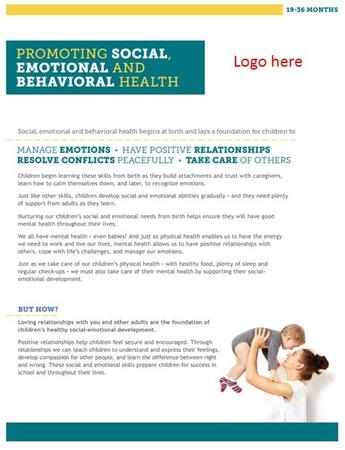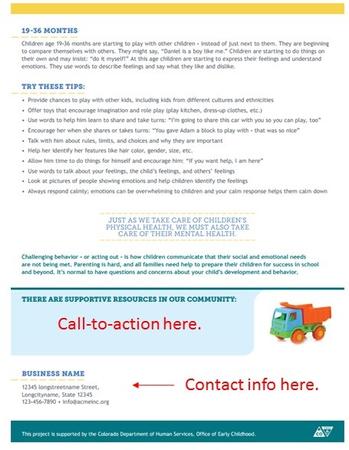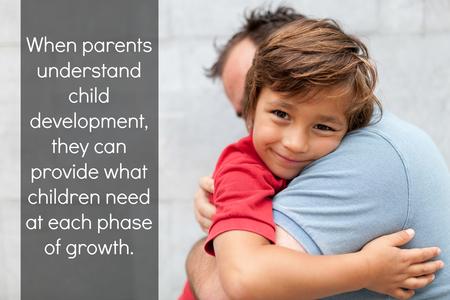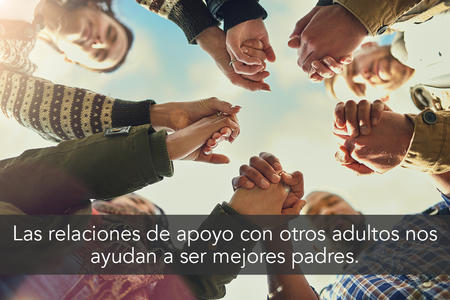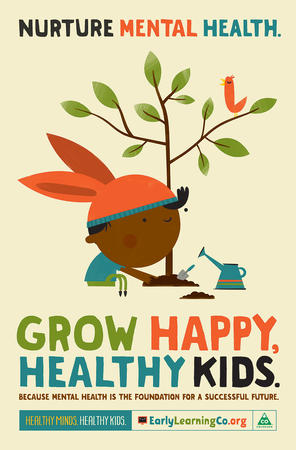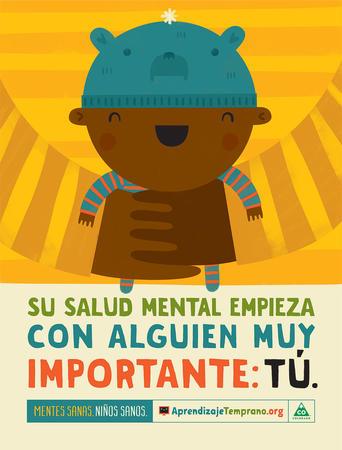Supporting Social-Emotional Development
Supporting Social-Emotional Development
As professionals, we often focus on children’s physical growth and learning milestones. But what about mental health? It’s a topic that often gets overlooked – especially in very young children.
Mental health can be a sensitive topic, but it’s important to talk about. That’s because everyone has mental health – even babies – and the foundation for lifelong mental health is set in the early years.
Children’s social-emotional development begins at birth with the relationships and experiences they have right from the beginning. With secure and loving relationships and positive experiences, children develop a foundation of mental health that supports them throughout their lives.
Social-emotional skills allow children to make friends, care for others, manage their emotions and resolve conflict peacefully. Actively supporting children to develop these skills will not only reduce challenging behavior but will help you build stronger relationships with families.
The information on this webpage will help you understand how to nurture a child’s mental health by supporting their social-emotional development.
- Videos: These short educational videos build professionals’ knowledge of social-emotional development and early childhood mental health.
- Print Materials: Customizable brochures for families to help parents and caregivers support social-emotional development from birth to age 8.
- Communication Tools: Ready-to-use social media content, posters, a fact sheet for policymakers, and more. Tools are designed to support outreach and communication to parents and others about social-emotional development.
- Messages: These messages can help deepen your understanding of social-emotional development and help you have more effective conversations with families.
- Early Childhood Mental Health Consultants: Professionals who provide free and confidential supports for children’s social-emotional development.
Social-emotional development may not be a familiar topic – even to experienced early childhood professionals.
These educational videos build professionals’ knowledge about social-emotional development and early childhood mental health.
The videos are tools to increase your own understanding. The videos can also help you have more effective conversations with parents about these sometimes-sensitive topics.
- An Important but Sensitive Topic
- The Foundations of Mental Health
- Tips for Professionals
- Communication Toolkit
- Conversations About Children’s Mental Health
- Key Messages for Parents and Caregivers
Get a summary of each video’s key points. Haga clic aquí para ver los videos en Español.
The videos are available to view online or you can download and save the videos in order to view them offline.
Even as we work to increase our own knowledge of how to support social-emotional development in our program, we can also help families support healthy development at home.
To educate families, there are Social Emotional Handouts (English) and Social Emotional handouts (Spanish), based on a child’s age, that include developmentally appropriate tips, ideas and activities.
- 0 to 8 months
- 9 to 18 months
- 19 to 36 months
- 3 to 5 years
- 5 to 8 years
There’s also a brochure, for professionals like you, with practical tips to incorporate more social-emotional learning into your program.
Introducing the Materials
These materials are meant to be a conversation starter. They are not meant to be left in your lobby or given to parents without an introduction.
Parents may have concerns about their child’s behavior. You can start the conversation and introduce the materials by recognizing that it’s completely normal to have these concerns and many parents do.
Make sure parents understand that by increasing our support of a child’s social-emotional development, we can make a positive difference in their mental health, behavior and overall well-being.
Give parents a copy of the appropriate handout (based on the age of their child) and walk them through it. Point out how each handout includes age-specific tips and ideas for parents to try at home.
Make sure you tell parents that there are resources in our community to support families if there is a behavioral or mental health concern and that they should reach out if they are worried.
Customizing the Materials
The print materials can be customized for your organization. There are spots on each of the materials (see images below) where you can add your organization’s logo, contact information and other important details, including a call-to-action.
A call-to-action is important. It answers the question: What do we want people to do as a result of reading this information?
The call-to-action is where to put information about services in the community that support early childhood mental health.
Directions to Customize Materials are available for step-by-step information on how to customize these materials with your logo and contact information.
Accessing the Materials
All the files for the print materials are available for download. There are customizable Social Emotional Handouts (English) and Social Emotional handouts (Spanish) for parents and caregivers of children from birth to age 8.
Instructions for customizing the materials are in the same folder.
Reducing the stigma around mental health takes all of us.
Through our work with children and families, we can support healthy social-emotional development. In this way, we help children develop strong mental health.
Whether it’s through in-person conversations, social media, the information you display in your program or other means, you have many opportunities to help families understand social-emotional development.
Conversations with Parents
In-person conversations with families are great opportunities to strengthen relationships with families while helping them learn how they can support social-emotional development at home. Check out these print materials to provide parents with specific tips and activities to support the social-emotional development of children of different ages. For parent handouts in Arabic Burmese, Somali and Vietnamese click here.
Social Media
Social networking sites like Facebook can help us reach parents with information about social-emotional development and early childhood mental health. There are Social Media content that you can post on your organization’s Facebook and Twitter pages. You can also share this social media content with other organizations for posting on their social media pages. This information is available at no cost. Also available are social media content in Arabic, Burmese, Somali and Vietnamese.
There are two social media “content calendars” in the folder. Content calendars make it easy to stay organized and post regularly to social media. Content calendars provide an easy reference that you can update each month and share with your partners. One content calendar in the folder focuses on content related to social-emotional development and mental health in early childhood. The other calendar has content focused on protective factors that help parents and caregivers raise healthy, happy kids.
Make these content calendars your own! Use the posts from the social media library that appeal to you. Modify other posts to fit your community. Add additional posts about local community resources. Then share the content calendar each month with your key partners.
The social media folder also has ready-to-post social media graphics – or images with text on them. Some of these graphics have been used in the sample content calendars. Social media graphics are available in both English and Spanish.
Posters
Posters are another way to effectively communicate important messages to parents and caregivers. View and download a selection of five fun and engaging posters that promote early childhood mental health. You can print and display these posters in your community in places that serve families with young children.
Libraries, health care clinics, child care programs, rec centers, and schools are all great places to put these fun, colorful posters. Posters are available in English and Spanish in three different sizes.
Fact Sheet for Public Officials
Information for policymakers and public officials needs to be specifically tailored to the issues that these individuals value most. This customizable fact sheet about early childhood mental health and social-emotional development has messages that resonate with community influencers. It needs to be customized by adding the name and contact information of your organization. Instructions for customizing the fact sheet are included with the fact sheet file.
You are free to use any of these outreach materials to support your communications with families.
Materials in Arabic, Somali, Burmese and Vietnamese
Access materials including parent handouts and social media cards.
Words have power. The messages we use when talking to families have the power to reduce the stigma that some people feel when discussing mental health.
Messages seek to present factual information in an interesting way. Messages aren’t meant only to explain an issue. Messages are about communicating the most important aspects of an issue.
But it’s not always easy to know what to say. Especially when talking about a sensitive topic.
The messages in this section seek to educate audiences about social-emotional development and mental health and communicate why it’s so important.
Key Messages about Social-Emotional Development
These messages can help you feel more confident as you begin the conversation. They cover the importance of social-emotional development, how to support it, and why mental health is just as important as children’s physical health.
If you need more messages, either to support your outreach or to build your own knowledge, there are additional messages.
These messages were developed based on information from reputable sources including Colorado’s Early Learning and Development Guidelines, the Center on the Developing Child at Harvard University, ZERO TO THREE, the Frameworks Institute, and the Shared Message Bank.
Metaphors to Increase Understanding of Brain Development
Researchers have studied the language that is most effective in helping people build a clearer understanding about child development – and also in breaking down unhelpful stereotypes. This research takes into account existing values and cultural models that shape our perceptions of child development and early adversity.
Understanding these metaphors, and using them in our conversations with families, can help deepen parents’ and caregivers’ understanding of their children’s early development, a key protective factor.
- Brain architecture
- Serve-and-return
- Resiliency scale
- Levelness
- Toxic stress
Access messages related to these brain development metaphors.
Audience-Focused Messages
The following messages are crafted to appeal to specific audiences. The programs and information public officials are interested in may be very different from what parents and caregivers care about.
Check out these audience-focused messages for:
We all have mental health – even babies! Just as we care for children’s physical health we must also take care of their mental health. We do this by supporting their social-emotional development.
By helping children to learn social and emotional skills, you can build stronger relationships with children and families. You can also reduce challenging behavior in children that you work with.
The resources above are intended to:
- Educate professionals about social-emotional development and early childhood mental health
- Offer tips on how to support healthy social-emotional development in early childhood programs
- Support communication and outreach to families
Early Childhood Mental Health Consultants
ECMH Consultants are experts in early childhood development and mental health. They work with professionals on-site at the program or another convenient location. ECMH Consultants work with providers and parents and caregivers. Learn more about the ECMH Consultants program and how it can benefit the children and families in your program, and download the fact sheetin English or the fact sheet in Spanish.
